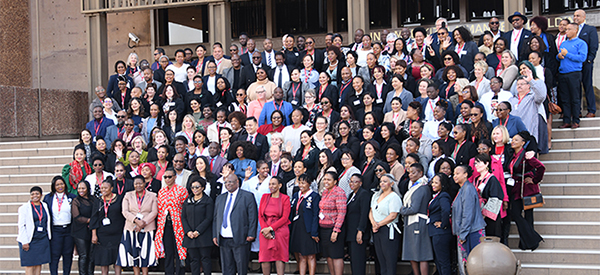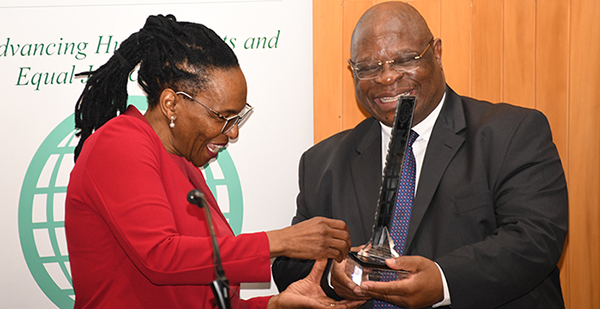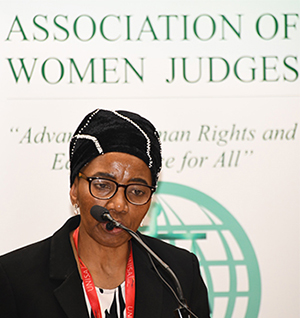College of Law
"Where did we go wrong as a nation?"
The 16th Annual Conference and Annual General Meeting of the South African Chapter: International Association of Women Judges (SAC-IAWJ), in collaboration with Unisa and the Department of Women, Youth and Persons with Disabilities (DWYPD), held the second session of their conference on Saturday 6 August 2022.
This event was not only held during Women's Month but also came amidst conversations around women's leadership that are met with barriers and gender-based violence (GBV) prevention measures that warrant intense deliberation. The programme was held under the theme "Empowerment as a tool to fight gender-based violence, #BreakingBarriersandBias".

Unisa Principal and Vice Chancellor, Prof Puleng Lenka-Bula; together with Chief Justice of the Republic of South Africa, Raymond Zondo (right); Deputy Chief Justice Designate of the Republic of South Africa and President of the SAC-IAWJ, Mandisa Maya (right); SAC-IAWJ members including Unisa staff and students.
Dehumanising the pandemic
In her foreword address, Deputy Chief Justice and SAC-IAWJ President, Mandisa Maya said GBV has been gaining momentum and worsened by the Covid-19 lockdown when many people were confined to their homes. Maya said: "Reports of cases involving brutal violence against women and children have been a daily South African staple for years, which intensified during the Covid-19 pandemic." She added: "But as the disease wanes, its after-effects on the economy and other socioeconomic challenges have pushed GBV to intolerable levels that require intervention from the government, schools and private society to combat this dehumanising pandemic."
Maya also acknowledged the efforts that need to be taken by society to prevent GBV, so there should be less duress on state resources while observing the scarcity of the necessary resources used by the police in bringing closure for the victims. She also said the courts need to do more to prevent recidivism as a deterrence measure.
"The responsibility of making sure that the perpetrators of these vile crimes are brought to justice rests on the criminal justice system and the various role players such as the police, health care providers and social services," said Maya. She added: "But where, for example, the police are under-resourced, do not have the tools or even the skills, the whole process collapses, the perpetrators are released back into society with the possibility of reoffending."
"Therefore, the courts play a crucial role in ensuring just outcomes and alleviating GBV," she stressed. Maya emphasised that the courts bear the difficult task of finding the right balance between a just sentence on the one hand and a clear message that will deter GVB in society. "But it's quite evident from the nature of these crimes that would-be offenders are generally not deterred; otherwise, we would not be where we are now," she said.
Maya also identified culture as one characteristic through which GBV strives. She mentioned, for example, the culture of not allowing women to participate in critical strategic policies that shape equality and democracy. She said: "Culture, in addition to patriarchy and other relationship dominance, have been identified as some of the other leading causes of gender-based violence, cultural violence, economic inequality, and underrepresentation of women in structures of power of influence that shape discussions and policy."

Deputy Chief Justice Designate and President of the SAC-IAWJ, Mandisa Maya (left) and Chief Justice Raymond Zondo (right)
Maya advised that one way to curb GBV, some of the work should begin at home, particularly on how parents raise their sons because home is where the moulding of men's world view about women and their place in society begins. She encouraged, therefore, that boys should be taught respect and equality for all genders from a young age.
Where did we go wrong?
Presiding as keynote speaker, Chief Justice Raymond Zondo, began by acknowledging the recent strides that South African women undertook in breaking barriers and making history in fields that men predominate. Noting in particular two current events: the Banyana Banyana's Africa Cup of Nations (AFCON) victory and the appointment of Justice Mandisa Maya as the first black woman Deputy Chief Justice in South Africa.
However, during his address, the conference went from cheerful to sombre when he acknowledged some of the victims that succumbed to brutal forms of gender-based violence. The Chief Justice lamented: "Unfortunately, this meeting also takes place a week after we were all shocked by a group of men who raped and assaulted eight women near a mine in Krugersdorp, Johannesburg."

Judge Nomsa Khumalo, Gauteng Division of the Hight Court SAC-IAWJ PC Gauteng
"As things stand, GBV is not decreasing, and as it increases, it manifests itself in even more serious forms. But we have to find a way to stop it because it is completely unacceptable that women, girls and old women cannot safely walk on our streets." So said Zondo, who also lamented how Uyinene Mretwana, a UCT student, Nosicelo Mtembeni, a UFS student and the recent sentencing of Ntuthuko Shoba, who premeditated the murder of his pregnant girlfriend, Tshegofatso Pule.
He stressed: "I mention all these events because I believe they should all force us to reflect on the state of our country, to go back to 1994 and to think about the kind of country we thought we were building." Zondo added: "As we stood in long queues, waiting to vote, many of us for the first time in our country, excited about the interim constitution, excited for the first time that we would have a voice on how we would be governed - excited that there was to be a likelihood of a black president in the country." But, he continued: "These things, particularly GBV, force us to ask ourselves a question as a country - where did we go wrong?"
In his closing remarks, Zondo praised women's strides in several critical South African events, including those who opposed the pass law in August 1965. He also acknowledged the women who came forward as witnesses during the State Capture Commission. And at length, he described how Justice Sisi Khampepe, who delivered the judgment that saw former president Jacob Zuma being handed a 15-month prison term, as key milestones that need to go further to entrench the equality between men and women.
* By Godfrey Madibane, Unisa Radio Journalist, Department of Institutional Advancement
Publish date: 2022/08/10

 Unisa co-hosts G20 community outreach in the Eastern Cape
Unisa co-hosts G20 community outreach in the Eastern Cape
 Unisans gain membership of prestigious science academies
Unisans gain membership of prestigious science academies
 Advocating for disability transformation through servant leadership
Advocating for disability transformation through servant leadership
 Unisa Press continues to illuminate the publishing space
Unisa Press continues to illuminate the publishing space